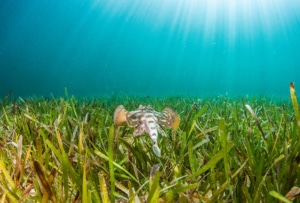Project Seagrass: Saving the unsung heroes of our coasts
In late Spring, a handful of Synchronicity Earth team[...]
Since 1980, we have lost over 35 per cent of the world’s seagrass meadows. That equates to about 1.5 per cent per year, or two football fields each hour. This rate of loss is equal to that of coral reefs and rainforests, yet seagrasses receive very little attention. Project Seagrass is here to change that!
Since its foundation in 2013, Project Seagrass is turning cutting-edge research into effective conservation action and education schemes, by collaborating with local communities and other stakeholders. As a dedicated team of seagrass scientists, they work to protect seagrass meadows, and through this, they support marine conservation more broadly and sustainable coastal development across the globe.

Synchronicity Earth’s Ocean Programme supports Project Seagrass to roll out the wider use of its citizen science seagrass mapping tool SeagrassSpotter in Southeast Asia. Via this tool, communities, organisations and individuals can engage more with seagrass meadows, learning about their importance and threats, while contributing to a global database that can help regional management authorities and other interested institutions to implement effective seagrass management, conservation, and restoration projects.
This is an important step towards the recognition, recovery and resilience of seagrass ecosystems globally; that provide biodiversity, equitable and sustainable livelihoods, and planetary life support.
In late Spring, a handful of Synchronicity Earth team[...]
When we think about important habitats, we often imagine a[...]